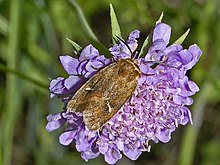| Eriopygodes imbecilla | |
|---|---|

| |
| Scientific classification | |
| Kingdom: | Animalia |
| Phylum: | Arthropoda |
| Class: | Insecta |
| Order: | Lepidoptera |
| Family: | Noctuidae |
| Genus: | Eriopygodes |
| Species: | E. imbecilla |
| Binomial name | |
| Eriopygodes imbecilla (Fabricius, 1794) | |
| Synonyms | |
| |
Eriopygodes imbecilla, the Silurian, is a moth of the family Noctuidae first described by Johan Christian Fabricius in 1794.
Distribution
This species is present in most of Europe.
Habitat
This species commonly lives on gullies and hollows in high moorland areas with host plants.
Description
For a key to the terms used, see Glossary of entomology terms.The wingspan is 24–27 mm. The colour of these small moths may vary from tawny to reddish brown. Forewings usually show a pale kidney mark and two wavy cross lines, but often these markings are quite indistinct. Usually females are darker or chocolate brown and smaller than the males. The rear wings are often pale greyish. Seitz describes it E. imbecilla F. (= aliena male Hbn., alpina female Hbn., disparilis O., nexa Dup.) Forewing rufous ochreous, sometimes grey-tinged, in the male, rufous brown in the female; veins finely brownish; inner and outer lines brown; submarginal obscure, the marginal area beyond it generally darker; reniform stigma externally whitish, preceded by a brownish median shade; hindwing greyish fuscous : fringe rufous. — Larva dirty grey, with a few yellowish grey hairs; dorsal line fine, whitish, traversing a series of black or brown oval blotches : lateral stripes dark grey, with a pale line at middle; spiracles black, each with a shining black point above it; head blackish, with 3 white lines.
Biology
Adults fly from June to July. Larvae are polyphagous on low plants, mainly feeding on bilberry (Vaccinium myrtillus), heath bedstraw (Galium saxatile), Knautia and Lamium.
References
- BioLib.cz
- Catalogue of Life
- Fauna Europaea
- ^ Savela, Markku. "Lasionycta imbecilla (Fabricius, 1794)". Lepidoptera and Some Other Life Forms. Retrieved June 27, 2019.
- ^ Butterfly Conservation
- "Eriopygodes imbecilla (Fabricius, 1794) - Silurian". The Cockayne Collection. Natural History Museum, London.
- The Moths of Suffolk
- Warren. W. in Seitz, A. Ed., 1914 Die Großschmetterlinge der Erde, Verlag Alfred Kernen, Stuttgart Band 3: Abt. 1, Die Großschmetterlinge des palaearktischen Faunengebietes, Die palaearktischen eulenartigen Nachtfalter, 1914
 This article incorporates text from this source, which is in the public domain.
This article incorporates text from this source, which is in the public domain.
- Moths and Butterflies of Europe and North Africa
External links
| Taxon identifiers | |
|---|---|
| Eriopygodes imbecilla | |
This Hadeninae-related article is a stub. You can help Misplaced Pages by expanding it. |